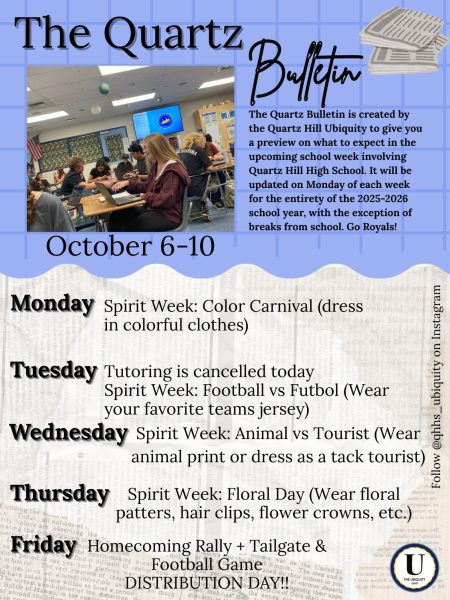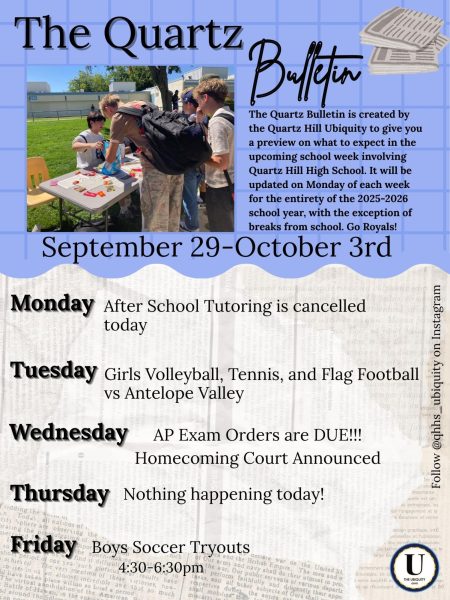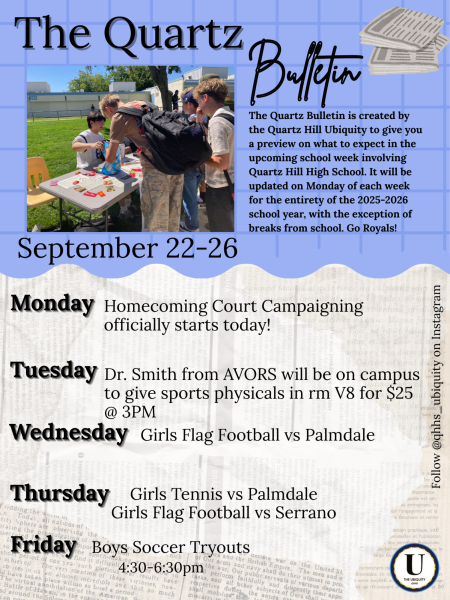The Credibility of Honors
Picture by Pranesh Kumar
Honors courses are typically defined as classes that are more rigorous and prestigious than a normal class. Students enrolled in honors classes generally receive greater academic recognition and also have an advantage in their weighted GPA. Historically, honors courses have been known to provide college-preparatory work and are meant for the highest achieving students. This same level of rigour continues to be pushed to some degree by teachers. Nevertheless, there are still students who complain about not only the lack of difficulty in certain honors classes, but also their overall credibility.
In every school, including our very own QHHS, there are a variety of students with a variety of academic backgrounds. Everyone feels academically challenged at certain levels, hence why most high schools allow students to pick from many different classes. The highest levels tend to be honors and AP (or IB), resulting in the top students picking these classes. This situation seems to be fine. However, the issue arises when students join honors classes because it looks better on their college resume or they are forced to by parents.
By all means, it is not bad for students to take up the challenge of honors classes to look more competitive. Being driven for success is, of course, a good sign for many students. While this is the case, the addition of these kids into the honors scene does complicate matters. Students who cannot cope with honors classes creep into the system, disrupting the upper-echelon students. The popular complaints of “This student doesn’t deserve to be in honors” or “Honors is not challenging enough” thus arise.
Mrs. Carbajal, an English 9 teacher who has both honors and regular classes, gave thorough insight into this matter: “I tend to teach the same curriculum to both of my classes, but the level at which I teach is completely different. Honors kids are amazing to interact with, and I love being able to progress smoothly with them. With regular kids, I have to constantly stop them and get them to stay focused. They have to be guided on many tasks which honors kids already get.”
Though amazed at the capabilities of honors students, Mrs. Carbajal also noted that honors kids are very divided: “80-90% of honors kids are incredible and deserve to be challenged, with the top 5-10% of these students being at an even higher level that is inspiring to witness as a teacher. Working with them is amazing. However, I do feel that there is that 10% of honors students who are not deserving of being in an honors class. ”
Many students, when this topic is brought up, are critical of the honors system, saying that it is not what they would like it to be. Shosei Shintani, for example, says that honors classes are “mixed.” “Some honors classes, such as my history class, are very challenging for me. My science and english classes are much easier, and I sometimes feel that some students shouldn’t even be in those classes. Honestly, I wish there was a level higher than honors so that students can feel more … challenged.”
There are the students in Quartz Hill that feel like honors classes are a “piece of cake.” Even so, a large group of students feel challenged in their classes regardless of whether they are honors or not. Kevin Parasca, a sophomore, reflected on this point: “I take mainly honors classes, but I see no problem with them. They are just fine the way they are and are challenging to the majority of students. Also, I have a friend that takes regular and honors classes. He too sees no problem with them.”
Overall, the issue of whether honors classes are rigorous enough or not comes down to opinion. Some say that the curriculums are challenging, while others feel that certain students are not qualified. A large portion of kids are fine with their classes. Ultimately, regardless of the flaws, students of all levels should learn to thrive with honors classes. As Mrs. Carbajal pointed out, “Students should know that more classes are available on campus and on the Virtual Academy. If they don’t feel challenged in a class, they should take more. If even this is not enough, they should consider doing additional work off campus.”
The world of knowledge is at one’s fingertips, especially in this new digital age. Honors classes and their possible shortcomings should therefore be the least of one’s issues, especially when the concern is that the class is too easy.

Hello! My name is Pranesh Kumar, and I am a Copy Editor for the QHHS Ubiquity Virtual Edition. As a fourth-year student of Journalism and an IB Senior,...








